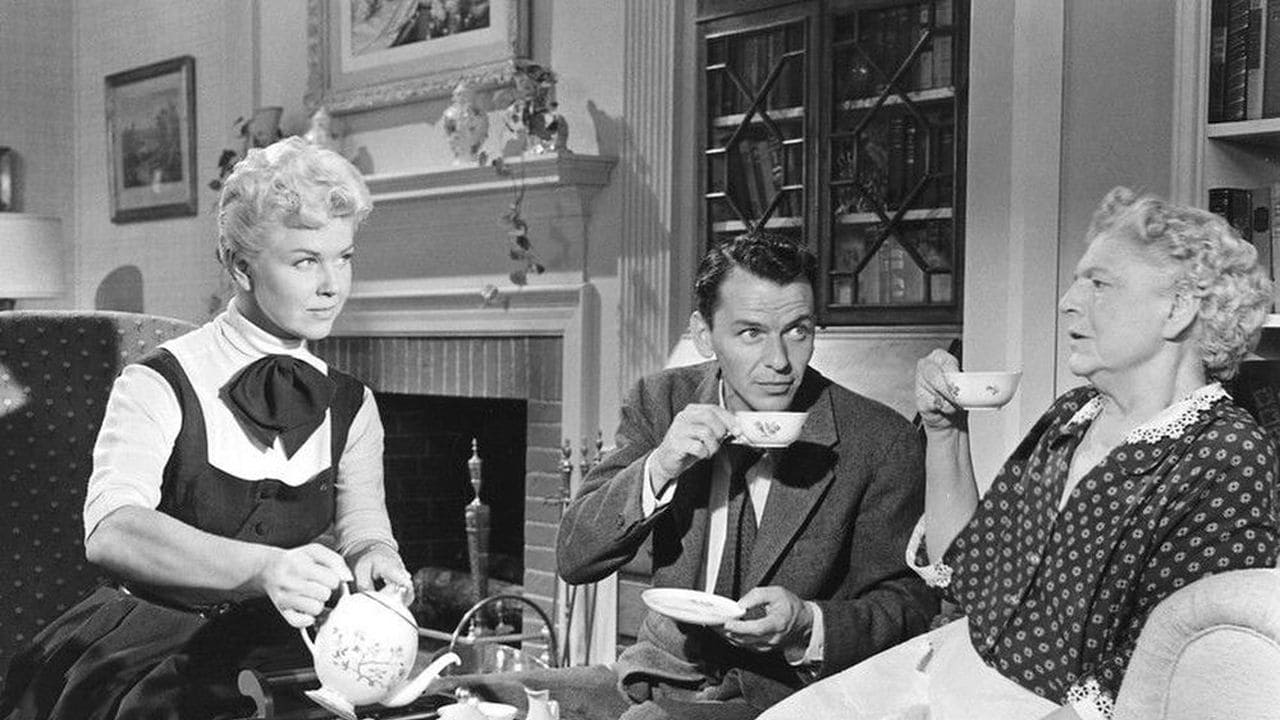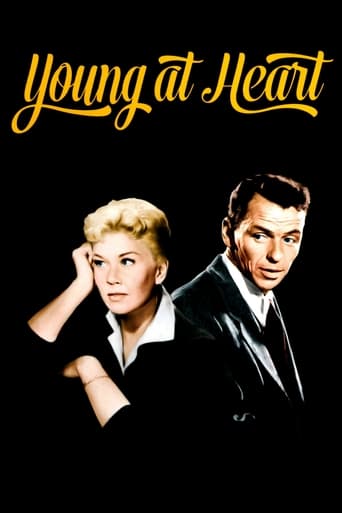Nonureva
Really Surprised!
ReaderKenka
Let's be realistic.
Konterr
Brilliant and touching
Livestonth
I am only giving this movie a 1 for the great cast, though I can't imagine what any of them were thinking. This movie was horrible
Brian Camp
At the time they made this movie, Frank Sinatra and Doris Day were both on the cusp of filling out the iconic images they'd become in a few short years and show remarkable chemistry as (potentially...seemingly?) ill-fated lovers in a picture-postcard Connecticut town who get married and move to a tenement in Manhattan. It's too bad they didn't make another film together. YOUNG AT HEART (1954) is an oddball family drama, incredibly downbeat in parts, with an ending that's 180 degrees away from the one in FOUR DAUGHTERS (1938) which, like this film, was adapted from Fannie Hurst's novel, "Sister Act." (Sinatra plays the part John Garfield played in the earlier film.) Except for a beach scene, it was all shot entirely on Warner Bros. soundstages and backlots. Sinatra and Day sing a lot but don't duet till the end. Sinatra sings more than Day and gets better songs, including some Gershwin and Cole Porter standards. Sinatra's solos are quintessential Sinatra. It's just him sitting at the piano, with his hat on, playing and singing to his heart's content, usually in a shabby club just before closing. Musically, it rarely gets better than this. I wish there'd been more of these numbers. The strange but colorful supporting cast includes Ethel Barrymore, Gig Young, Robert Keith (Brian's dad), Dorothy Malone, Lonny Chapman, and pre-Skipper Alan Hale Jr. These actors are all fine, but I would have preferred to see the two stars in something that wasn't cluttered with so many other people. This was only the second film Sinatra made after his incredible Oscar-winning comeback in FROM HERE TO ETERNITY (1953). (In the interim, he'd played a presidential assassin—part of a hit team working for a high-level conspiracy—in SUDDENLY, 1954.) Sinatra's still a notably skinny guy here and looks much younger than his 38 years. He plays a talented musician who doesn't believe he has a chance at success. He mopes a lot and browbeats himself and resents others' success and always has a cigarette dangling from his lips. Plus, he keeps his hat on in the house. Doris almost weds Gig Young but dumps him at the last minute for his much needier friend, Sinatra. She tries to change the grumpy Sinatra, to make him happier. Good luck. Why didn't these stars ever reteam? Especially late in life, guided by a master director at the top of his game. What a film that would have made. YOUNG AT HEART's director, Gordon Douglas, went on to direct Sinatra in four films in the 1960s, including two of the star's best, ROBIN AND THE SEVEN HOODS (1964) and THE DETECTIVE (1968).
MARIO GAUCI
A musicalization of a classic “woman’s picture” is about as unappetizing a prospect as can get for me film-wise, but the polished Hollywood expertise here wins out in the end and makes for a refreshing and appealing movie that I had long underestimated (it was shown several times on Italian TV but I never bothered with it).Doris Day and, especially, Frank Sinatra are well-matched as star-crossed lovers in small-town America; Day comes from a classically-trained musical family headed by Robert Keith and including Dorothy Malone (with spinster aunt Ethel Barrymore watching maternally from the sidelines). Amiable popular music composer Gig Young bursts in on their quiet, happy family life (all the girls naturally fall for his charms) but this is further exacerbated by the belated introduction of his arranger pal, embittered long-time loser Frank Sinatra. The film’s narrative is largely made up of the romantic entanglements of the trio of girls (two of whom are engaged to local guys but pine for Young) while Day is longed for by Young but is immediately drawn to outsider Sinatra. Robert Keith is really no match for Claude Rains – who had played the father in Michael Curtiz’s original FOUR DAUGHTERS (1938) – but Sinatra does manage to make John Garfield’s star-making, Oscar-nominated turn his own.Curiously enough, the screenwriters of YOUNG AT HEART – Julius J. Epstein and Lenore Coffee – were the very same duo who had earlier adapted FOUR DAUGHTERS to the screen; however, as is already apparent, the original movie had four daughters instead of three, the character names were also altered and the remake was even given a schmaltzy, happy ending! Naturally, both Day and Sinatra get to sing in the film but they only have a modest duo of sorts at the very end; incidentally, I was let down by the finale not just because of its improbable “all’s well that ends well” qualities but also because, after Sinatra is seen toiling at his magnum opus throughout the whole movie, the result is just a corny love song! At the very least, I was expecting the classic title tune to be it (which he does get to sing over the opening credits). Incidentally, he seems to have had a good working relationship with director Gordon Douglas – since they would reteam three more times in the next 14 years.
Neil Doyle
FRANK SINATRA followed up his "From Here To Eternity" triumph by starring opposite DORIS DAY in a musical remake of "Four Daughters" called YOUNG AT HEART. He gets even better song material than Day, including memorable versions of "Young at Heart" and "One for My Baby", but Day is compensated by a nice dramatic role that gets her brand of warmth and sincerity, as well as a duet with Sinatra on "You, My Love".ETHEL BARRYMORE is the elderly aunt and ROBERT KEITH is the father, while GIG YOUNG plays the young man that Day almost marries until she discovers that her sister is broken-hearted over their upcoming marriage. Instead, she runs off with the loner, Barny (Sinatra), and has a rather tumultuous marriage that she's determined to salvage. This version of the tale has her succeed, avoiding the downbeat ending of the original in which the John Garfield character (played by Sinatra)died.It's pleasant, nostalgic and the kind of musical they never make any more. Particularly sensitive performances from Sinatra, Day and Gig Young under Gordon Douglas' direction. Worth seeing for fans of Day and Sinatra especially.The only big difference between this and the original is that color and music have been added. Otherwise, the script is pretty close to the 1938 version directed by Michael Curtiz.
writers_reign
In musical terms this is, in many ways, two separate films; in one we have Doris Day singing the kind of sunny, feel-good songs she was recording successfully at that time - the mid fifties - and in the second we have Sinatra singing songs for Adults - with one exception 'standards' - as only he can. The story itself is, of course, our old friend the catalyst or what happens when an outsider is obliged by circumstances to join, usually temporarily, an existing social fabric and test its tolerance. In some ways this is a remarkably accurate musical version of Fannie Hurst's old potboiler 'Four Daughters' which back in 1938 introduced John Garfield to Hollywood. Fresh from the Group Theatre and weaned on Clifford Odets' machine-gun vitriolic dialogue Garfield had much the same impact on Hollywood and moviegoers as his character did on the all-American family headed by Claude Rains. For the remake Warners dropped one of the daughters, switched the locale to New England and turned Sinatra loose on father Robert Keith, aunt Ethel Barrymore and sisters Doris Day, Elisabeth Fraser and Dorothy Malone. If you watch Four Daughters immediately before Young At Heart you will hear that much of the dialogue - especially that originally spoken by Garfield - has been retained. Okay, it's a meller through and through but all hands are on the top of their game and Sinatra has seldom sung better on screen. The fact that he doesn't appear for a good half hour merely adds to the feeling of two separate films because we've had that half hour to adjust to the 'homeliness' of the Tuttles and Doris Day has laid most of her 'cute' songs on us so that the whole effect is to lull us into cosy expectation of a 'nice' movie and then Sinatra explodes into the frame and hijacks the movie. This is one to see again and again.

